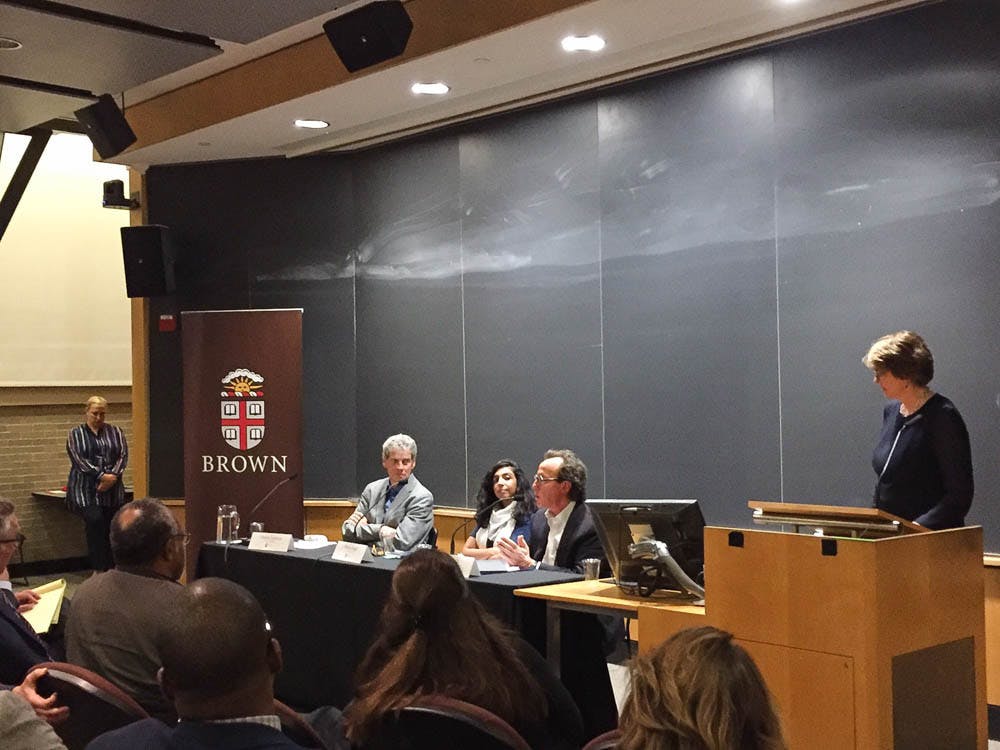“In America, institutional politics can always, at some point, undo whatever gains are made through movement politics,” said Mark Lilla during his lecture Thursday night. As part of the Reaffirming University Values series, the Columbia humanities professor and essayist for the New York Review of Books, delivered a lecture titled “After Identity Liberalism.”
Following the publication of his book, “The Once and Future Liberal: After Identity Politics,” Lilla discussed the detriments of identity politics to the Democratic Party and ways of unifying the country under common values and a shared destiny.
Lilla credited “movement politics,” an activist approach to politics, with helping to make the United States a more tolerant and inclusive place. But he argued that a more traditional hold on institutional politics is necessary to long-term success effecting change.
The present danger is a hyper-radical, institutionally powerful Republican Party, Lilla said. The Republican Party achieved its power through electoral politics, not movement politics, he said.
Lilla criticized liberals for concentrating on the coasts, in liberal universities and in the media establishment. Liberals also do not have one message that addresses the whole country, he said. This denial of shared American experience means that liberals may be inclined to give up on certain people and places, and rather consider political campaigning as an exercise in targeting.
Identity politics have changed over time, he said, adding that today’s identity politics have become pseudo-politics of the self, projected onto society.
Students have tremendous energy, but have to direct that energy in the right way, he said. He advised students to spend their summer working in swing states and winning the Democratic Party more seats in Congress. He told students that their adversary is not the person who uses the wrong word or has a different opinion, but the radicalized Republican Party.
Professor of Philosophy Charles Larmore and Assistant Professor of Political Science and International and Public Affairs Prerna Singh, who were selected to engage with Lilla in front of the audience, questioned Lilla’s opinions on identity politics and achieving unity in the United States.
While agreeing with Lilla on how identity politics is changing the Democratic Party, Larmore said it is an overgeneralization to say that identity politics is taking over the party. Disagreeing with Lilla, Larmore said identity politics should not supplement institutional politics, but that both are equally important. Larmore countered Lilla’s idea of a collective American “we,” specifically regarding citizenship as a unifying factor.
“Just because something is desirable, it doesn’t mean it exists,” Larmore said.
Responding to Lilla’s “The Once and Future Liberal,” Larmore said that American exceptionalism is a myth and that America is founded on crimes against humanity, like genocide and slavery, not on values Lilla mentions in his book.
Singh raised similar concerns on Lilla’s ideas on unifying America through citizenship. Nationalism, while dangerous, will be the unifying factor, not citizenship.
After the discussion, students asked Lilla about what ideas unify the United States, the country’s common values, and why liberals hesitate to focus on unifiers like liberty and equality. Another student who identified as Muslim criticized Lilla on his opinion on identity politics and argued how certain policies affect marginalized communities. The student asked Lilla how his own privileges as a white man influenced his beliefs.
Lilla answered the questions by talking about how Trump presents a danger to the Muslim community and how this should upset all Americans.
One of the attendees, Daniel Shemano ’19, said that he attended the event because he read Mark Lilla’s piece in the Wall Street Journal in which he talks about how Democrats lost because of identity politics. He said he agreed with Lilla on the effects of identity politics but added that Lilla was too vague in defining citizenship.





